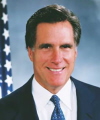Edwards and Romney Maintain Advantage in Iowa
Underdogs John Edwards and Mitt Romney continue to lead their respective Republican and Democratic caucus matchups, according to a brand new poll by KCCI-TV / Research 2000.

The poll of 400 likely Iowa Democratic caucus voters, conducted July 23-25, finds John Edwards with a 5-point lead over Hillary Clinton, at 27—22 percent. Clinton, who is leading her Democratic competitors in every national poll, and in almost every state poll, previously had a 28—26 percent lead over Edwards in a KCCI-TV / Research 2000 poll conducted in mid-May. While Edwards has been leading in Iowa in many other polls, this is his first outright lead measured by KCCI-TV / Research 2000.
Barack Obama received the third most support, at 16 percent—down from 22 percent in May. New Mexico Governor Bill Richardson has seen his stock rising: from 1 percent in December 2006, to 7 percent in May, to 11 percent in the July survey. Joe Biden (3 percent), Chris Dodd (2 percent), Dennis Kucinich (2%), and Mike Gravel (1 percent) round out the Democratic field. Sixteen percent of likely Democratic caucus voters are undecided—up from 11 percent in December and May.

On the Republican side, Mitt Romney—who nationally is polling in third or fourth (when Fred Thompson is listed as a candidate)—continues his surge in support among Iowans. Romney’s measured support has risen from 9 percent in December to 16 percent in May to 25 percent in the new KCCI-TV / Research 2000 poll. Romney now leads outside the margin of error in all major public opinion surveys conducted since June (including American Research Group and Mason-Dixon).
Fred Thompson received 14 percent in the new poll, up from 9 percent in May. Rudy Giuliani’s measured support continues to fall (from 26 in December to 17 in May to 13 percent in July) as did John McCain’s (from 27 to 18 to 10 percent).
Possible candidate Newt Gingrich received 6 percent, followed by Tom Tancredo (2 percent), Tommy Thompson (2 percent), Mike Huckabee (2 percent), Sam Brownback (2 percent), and Duncan Hunter (1 percent). Ron Paul did not receive a measurable amount of support.
For the third straight poll nearly a quarter (22 percent) of likely Republican caucus voters were not sure for whom they would vote.
